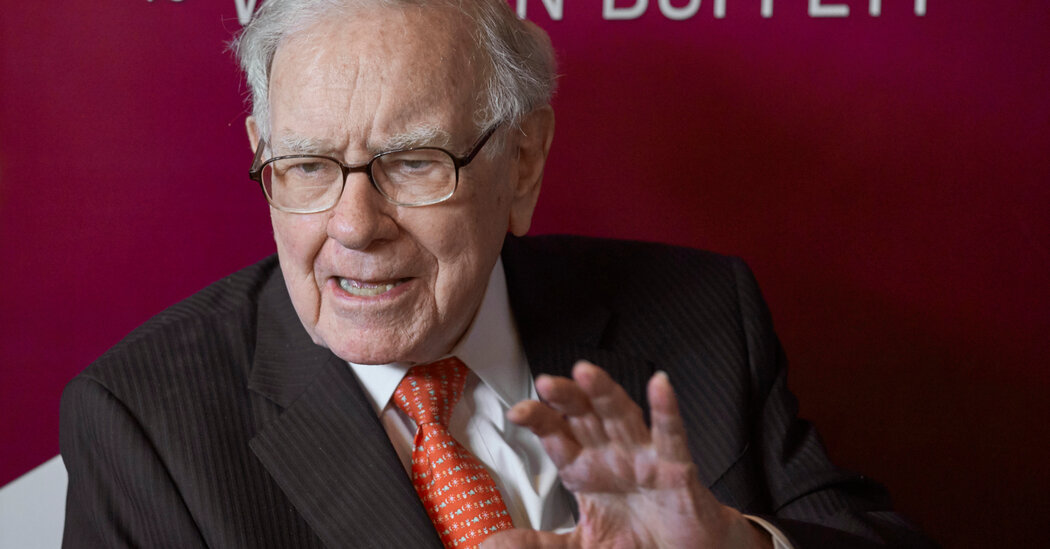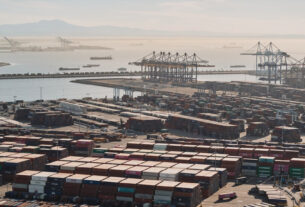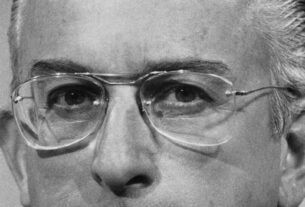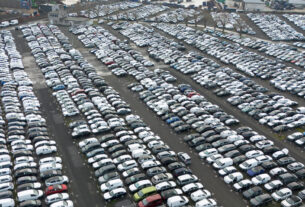Warren E. Buffett, the famed investor known for his enthusiasm for undervalued stocks and businesses, is feeling bullish these days about a traditionally staid investment: Treasury bills.
The cash stockpile held by Berkshire Hathaway, his sprawling multinational conglomerate, rose past $334 billion at the end of last year, including $286 billion in short-term Treasuries. The conglomerate more than doubled its Treasury holdings from a year earlier, thanks in part to the cash generated by selling a big chunk of its stake in Apple.
In his annual report and letter to shareholders, released on Saturday, Mr. Buffett defended Berkshire’s hoard, which he has said he was happy to keep building up unless or until a potentially lucrative investment opportunity arose.
“Berkshire will never prefer ownership of cash-equivalent assets over the ownership of good businesses,” Mr. Buffett wrote.
But the steady interest rates offered by Treasury bills helped stabilize Mr. Buffett’s empire during a year in which more than half of the nearly 200 businesses it operates saw their earnings drop. Berkshire Hathaway had net earnings last year of $90 billion, a decline from the more than $96 billion it generated a year earlier.
The company’s operating earnings — the metric Mr. Buffett prefers because it excludes paper losses and gains on investments that have not been sold — were $47 billion in 2024, up from $37 billion in 2023.
Berkshire’s core business line, insurance, showed significant gains in its investment and underwriting income. The lack of any “monster” event in 2024 was a major boon, Mr. Buffett wrote, though he acknowledged that the industry will have to “unemotionally take our lumps” when that luck turns.
“Someday, any day, a truly staggering insurance loss will occur,” he wrote. “Think wildfires,” he added later in a parenthetical note, referring to the fires that devastated Los Angeles.
Geico, Berkshire’s car insurance business, moved from a nearly $2 billion loss on its underwriting business in 2022 to earnings of nearly $8 billion in 2024.
The company was “a long-held gem that needed major repolishing,” Mr. Buffett wrote, citing the work that Todd Combs has done to overhaul the business. Mr. Combs is a Berkshire investment manager who became Geico’s chief executive in 2020.
Berkshire finalized its hold last year on Pilot Travel Centers, a gas and truck stop chain in which the conglomerate started investing in 2017. It now owns the company outright.
But Pilot’s earnings plunged last year, falling to $614 million — down nearly 37 percent from a year earlier — as part of a broader drop in profit at Berkshire’s retail and service businesses, which include Dairy Queen, the furniture renter CORT and the private jet business NetJets. Lower average fuel prices took a toll on Pilot, Berkshire said, and a growing consumer preference for eating at home dragged on Dairy Queen’s results.
Berkshire sold nearly 70 percent of its Apple stock last year, relinquishing more than 600 million shares, though Apple remains Berkshire’s largest equity holding. The gains on those sales contributed to a milestone Mr. Buffett noted in his letter: a tax bill of $26.8 billion, which he called an American record and said was equal to “about 5 percent of what all of corporate America paid.”
Mr. Buffett, who is 94, has run Berkshire from his hometown, Omaha, for decades, transforming the namesake textile manufacturing firm into a sprawling multinational conglomerate whose holdings include a railroad, jewelry retailers, a candy maker and investments in blue-chip companies like American Express and Coca-Cola. Last year, the company’s market valuation surpassed $1 trillion.
He called out the Berkshire’s railroad and utility operations, its two largest business areas outside insurance, as ones that held steady in 2024 but “have much left to accomplish.” BNSF Railway had an operating profit of $5 billion, a slight drop from a year earlier, while Berkshire Hathaway Energy earned $3.7 billion, up 60 percent from the prior year. Higher earnings from natural gas pipelines helped the utilities business line, as did lower estimated wildfire losses in 2024, compared with 2023.
One place where Mr. Buffett sees opportunity is Japan. Six years ago, Berkshire began amassing a stake in five diversified Japanese companies, and it quickly paid off: The company paid nearly $14 billion for shares that ended the year with a market value of more than $23 billion. Mr. Buffett said he anticipates Berkshire will retain its Japanese holdings for decades.
Mr. Buffett said he plans to be onstage again this year in May for Berkshire’s annual shareholder meeting, a folksy extravaganza that’s been called the “Woodstock of capitalism.” In a nod to his advancing age, he wrote that “it won’t be long” before Greg Abel, the leader of Berkshire Hathaway Energy and his designated successor, replaces him as Berkshire’s chief executive.
But Mr. Buffett, who has shown no eagerness to step down, included in his newsletter a lengthy anecdote about Pete Liegl, the founder of Forest River, a company Berkshire bought in 2005. Forest River grew to become the nation’s largest manufacturer of outdoor recreational vehicles like cargo trailers, pontoon boats, buses and vans, and it contributed “many billions,” Mr. Buffett said, to the wealth of Berkshire’s shareholders
“Pete died in November, still working at 80,” Mr. Buffett wrote approvingly.





